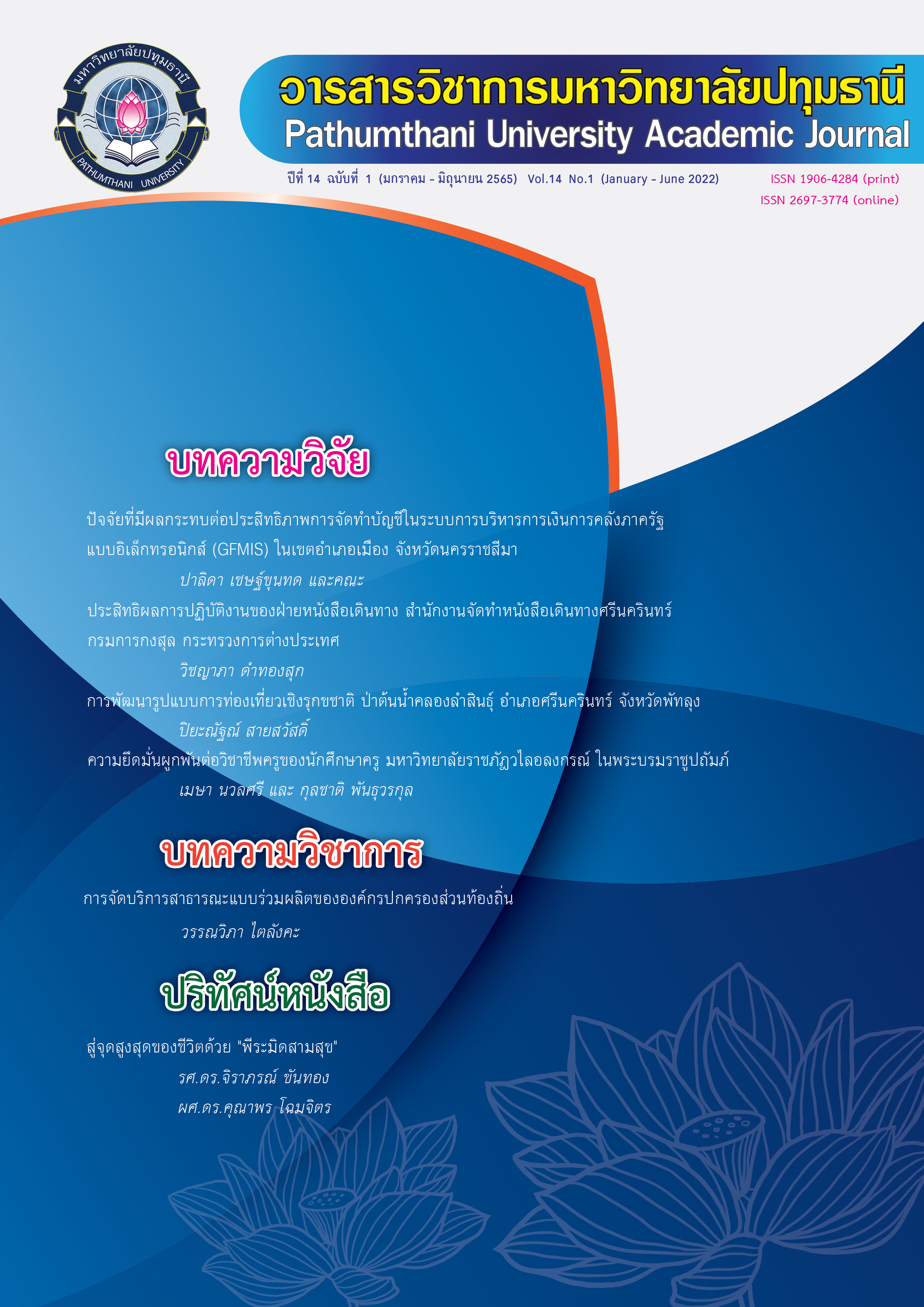TEACHING MODEL DEVELOPMENT TO PROMOTE THE CRITICAL THINKING SKILLS IN SCIENCE COURSES FOR GARADE 8 STUDENTS
Keywords:
Teaching Model , Problem Solving Thinking , Critical ThinkingAbstract
This research was created for the purpose of developing a teaching for promoting the critical thinking skills in the science courses for the Grade 8 students, using the research and development process, consisting of 4 steps as follows: Step 1: study the components, needs and guidelines for educational development Step 2: creating a teaching model, Step 3: teaching model experiment, and Step 4: the study about satisfaction. The sample of this study was group of 50 students of Grade 8 at Triamudomsuksanomklao Kabinburi School in the second semester of the 2018 academic year.
The results revealed that the form consisted of 6 components: 1) principle(s), 2) objective(s), 3) procedure(s), 4) response(s), 5) social system(s) and 6) supporting system(s). There were seven steps of the teaching process as follows: A: Activating and application, B: Brainstorming, C: Critical Thinking, D: Discovering, E: Evaluations, F: Feat and G: Genius. In terms of the effectiveness of the teaching style to promote critical thinking skills for Grade 8 students, the value was 82.87/82.65 which was higher than the 80/80 threshold set. The students have developed the critical thinking skills after studying with a teaching style(s) to promote the critical thinking skills in science for students in Grade 8; it showed that the result obtained was higher than before studying statistically significant at the .05 level. Based on the results of the student satisfaction level with the implemented teaching style(s) for promoting the critical thinking skills in science for Grade 8 students, the overall level was at a high level.
References
กมลรัตน์ สมใจ. (2560). การพัฒนารูปแบบการเรียนรู้ร่วมกันบนเว็บที่มีระบบพี่เลี้ยงสนับสนุนเพื่อส่งเสริมการคิดอย่างมีวิจารณญาณในระดับอุดมศึกษา. วิทยานิพนธ์ปริญญาปรัชญาดุษฏีบัณฑิต สาขาวิชาคอมพิวเตอร์ศึกษา. มหาวิทยาลัยราชภัฏมหาสารคาม.
กุณฑรี เพ็ชรทวีพรเดช และคณะ. (2558). “การพัฒนารูปแบบการจัดการเรียนรู้วิทยาศาสตร์เพื่อ ส่งเสริมการคิดอย่างมีวิจารณญาณของนักเรียนชั้นมัธยมศึกษาตอนปลาย”. วารสาร มหาวิทยาลัยนครพนม. ปีที่ 5 ฉบับที่ 2. หน้า 24-32.
จิรัชญา คิดเห็น. (2557). การเปรียบเทียบผลสัมฤทธิ์ทางการเรียน การคิดอย่างมีวิจารณญาณและจิตวิทยาศาสตร์ รายวิชาชีววิทยา เรื่องพันธุศาสตร์และเทคโนโลยีทางDNA ชั้นมัธยมศึกษาปีที่ 6 ระหว่างการจัดกิจกรรมการเรียนรู้ตามแนวคิดประเด็นวิทยาศาสตร์กับสังคมและการจัดกิจกรรมการเรียนรู้โดยใช้ปัญหาเป็นฐาน. วิทยานิพนธ์ปริญญาการศึกษามหาบัณฑิต. สาขาวิชาหลักสูตรและการสอน. มหาวิทยาลัยมหาสารคาม.
บรรจง อมรชีวิน. (2556). การคิดอย่างมีวิจารณญาณ : หลักการพัฒนาการคิดอย่างมีตรรกะ เหตุผล และดุลยพินิจ = Critical Thinking. กรุงเทพมหานคร : สถาบันการคิดอย่างมีวิจารณญาณ.
พิมพันธ์ เตชะคุปต์ และพเยาว์ ยินดีสุข. (2557). การจัดการเรียนรู้ในศตวรรษที่ 21. กรุงเทพมหานคร : โรงพิมพ์แห่งจุฬาลงกรณ์มหาวิทยาลัย.
พิชญ์สินี ไสยสิทธิ์. (2561). ผลสัมฤทธิ์ทางการเรียนและความสามารถในการคิดวิจารณญาณ วิชาฟิสิกส์พื้นฐาน ของนักเรียนชั้นมัธยมศึกษาปีที่ 4 ที่ได้รับการจัดการเรียนรู้แบบสืบเสาะหา ความรู้. วิทยานิพนธ์ปริญญาครุศาสตรดุษฎีบัณฑิต สาขาวิชาเทคโนโลยีและสื่อสารการศึกษา. จุฬาลงกรณ์มหาวิทยาลัย.
ไพโรจน์ คะเชนทร์. (2556). ผู้ปกครองและชุมชนยุคปฏิรูป. กรุงเทพมหานคร : เซ็นเตอร์ ดิสคัฟเวอรี.
มณเฑียร ส่งเสริม. (2561). การพัฒนารูปแบบการจัดการเรียนรู้ชีววิทยาเพื่อพัฒนาการคิดวิเคราะห์คิดอย่างมีวิจารณญาณและคิดแก้ปัญหาสำหรับนักเรียนชั้นมัธยมศึกษาปีที่ 6. วิทยานิพนธ์ปริญญาการศึกษาดุษฎีบัณฑิต สาขาวิชาหลักสูตรและการสอน. มหาวิทยาลัยบูรพา.
วิจารณ์ พานิช. (2556). ครูเพื่อศิษย์สร้างห้องเรียนกลับทาง (พิมพ์ครั้งที่ 2). กรุงเทพมหานคร : บริษัท เอส. อาร์. พริ้นติ้ง แมสโพรดักส์ จำกัด
วีระ สุดสังข์. (2550). การคิดวิเคราะห์ คิดอย่างมีวิจารณญาณ และคิดสร้างสรรค์. กรุงเทพมหานคร : สุวีริยาสาส์น.
สุวิทย์ มูลคำ. (2557). ครบเครื่องเรื่องการคิด. (พิมพ์ครั้งที่ 8). กรุงเทพมหานคร : ภาพพิมพ์.
Bruner, J. S. (1983). In search of mind: Essays in autobiography. New York: Harper & Row.
Joyce, B. R. and Weil, M. (2009). Model of Teaching. (8th ed). New York: Allyn & Bacon.
Downloads
Published
How to Cite
Issue
Section
License
Copyright (c) 2022 teera Pathomwong

This work is licensed under a Creative Commons Attribution-NonCommercial-NoDerivatives 4.0 International License.
บทความที่ได้รับการตีพิมพ์เป็นลิขสิทธิ์ของวารสารมหาวิทยาลัยปทุมธานี
ข้อความที่ปรากฎในบทความแต่ละเรื่อง เป็นความคิดเห็นส่วนตัวของผู้เขียน กองบรรณาธิการไม่จำเป็นต้องเห็นด้วยเสมอไป และไม่มีส่วนรับผิดชอบใด ๆ ถือเป็นความรับผิดชอบของผู้เขียนแต่เพียงผู้เดียว



